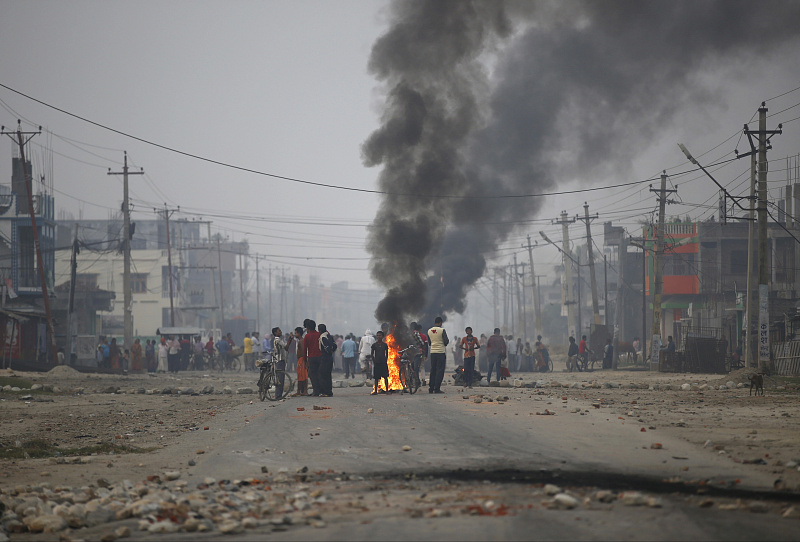Does U.S. Developmental Aid to Nepal Come with Political Strings?
In
Log in if you are already registered
The South Asian nation of Nepal recently saw protests break out in its capital as parliament deliberated a 2017 developmental deal with the US that was tabled in late February. The “Millennium Challenge Corporation” (MCC) aims to provide $500 million worth of grants for constructing power lines and roads but some members of the coalition government suspect that it secretly comes with political strings attached. The authorities had to use tear gas and water cannons to contain the unrest.

Source: Reuters
Critics of the MCC allege that it is part of the U.S. grand strategic goal of “containing” China, pointing to statements from U.S. officials as cited by Russia’s RT. The outlet reminded its readers how former U.S. Deputy Assistant Secretary of State for South Asia David J. Ranz informed everyone that the MCC was a crucial part of his country’s Indo-Pacific strategy, which is widely regarded among many as a euphemism for containing China.
They also mentioned how incumbent Assistant Secretary for South Asia Donald Lu warned how relations between the two countries might be “reviewed” if the MCC isn’t approved. This initiative is also extremely controversial because it’ll have priority over national laws where they conflict, according to reports. This raises very serious questions about the wisdom of Nepal surrendering some of its sovereignty to a country halfway across the world that’s openly hostile to its Chinese neighbor.
Nepal ultimately ratified the agreement on 27 February, incorporating a clause stipulating that it won’t be part of any political, military, or strategic alliances, “including the Indo-Pacific Strategy.” Even so, the latest unrest showed that not all people across the world and especially in Asia trust the US, and even those most in need of developmental assistance like Nepal suspect that America might have ulterior motives for giving them free money, not to mention half a billion dollars.
It's certainly concerning that the MCC would override national laws if parliament approves this compact. Objective observers struggle to understand why the U.S. would attach such strings to its aid if it doesn’t indeed have the ulterior motives that some Nepalis suspect them of. The MCC scandal shows that everything isn’t all that it seems when it comes to the U.S. recent focus on economically engaging with Global South countries.
Considering the obviousness of its anti-Chinese intentions, which cover multiple spheres from the military to tech and economic ones, these fears are legitimate and worth exploring more at length. It might not end up being the case that the U.S. secretly deploys troops to Nepal under the cover of the MCC like some have speculated, but there’s little doubt that some of its policymakers might flirt with weaponizing this aid for strategic reasons related to unfairly competing with Chinese companies there.
Chinese President Xi Jinping’s visit to Nepal in October 2019 was a milestone in bilateral relations and saw the two sides agreeing to work closely together on the Belt & Road Initiative (BRI) in order to intensify their comprehensive strategic partnership. Despite being purely apolitical and economically driven, antagonistic media and official sources from abroad maliciously misportrayed Beijing’s intentions as purportedly being aimed against third parties like the U.S. and India.
Even though Indian-Nepali relations became complicated in recent years owing to some unexpected bilateral disputes, they still remain strong and time-tested. This makes the likelihood of Kathmandu doing anything to harm New Delhi’s interests extremely low, notwithstanding the fact that Beijing has no such intentions either, especially vis-à-vis Nepal. Nevertheless, the false information warfare narrative alleging otherwise found popular resonance among some in the U.S.-led West.
Though the MCC predates President Xi’s visit by two years, it became increasingly contentious after former US President Donald Trump’s public crusade against China that was continued by his successor Joe Biden. Regional trust in the US is very low right now after America abandoned its Afghan allies during its chaotic evacuation from the country last August. The U.S. fake news-driven information warfare campaigns against China and Russia also further discredited its already terrible reputation.
It is therefore not without reason that some Nepalis are suspicious of the MCC and particularly its demand that the compact override national legislation whenever the two are in conflict. Considering the fact that parliament just ratified the compact, hopefully the authorities will be able to manage its potential impact on sovereignty as well as public opinion. The best-case scenario would be for the US to prove its detractors wrong and not weaponize this aid initiative against China.
American Moscow-based political analyst specializing in the relationship between the US strategy in Afro-Eurasia, China's One Belt One Road global vision of New Silk Road connectivity, and Hybrid Warfare
Blog: Andrew Korybko's blog
Rating: 1




